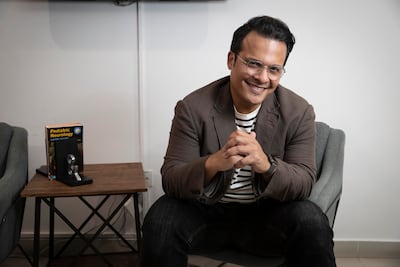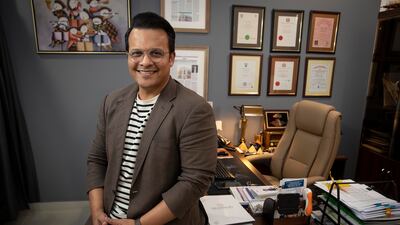Four years ago, Dr Arif Khan founded Neuropedia, the UAE’s first paediatric neurosciences centre for neurological conditions such as epilepsy, sleep disorders, autism and attention deficit hyperactivity disorder. It now has branches in Dubai and Sharjah.
Raised in Dubai and of Indian heritage, the paediatric neurologist worked in the UK’s National Health Service before returning to the Middle East in 2015 to work in Abu Dhabi and Dubai with Mediclinic and NMC hospitals.
Dr Khan, 46, his wife, an obstetrician/chief of obstetrics and gynaecology, and their children, aged 13, 10 and 7, live in Arabian Ranches.
What financial traits influenced your childhood?
I was brought up in Dubai in the 1970s and 1980s. At that point, we were living in a two-bedroom house. My mother was a housewife. I learnt the art of money allocation and budgeting from her.
My father worked in a large business conglomerate for 44 years, climbed the ladder from cashier to general manager. I learnt loyalty and dedication from him.
The size of our house increased, the car, clothes we wore … the numbers and quality got better, but he used to drive into me that you have to save for a rainy day.
Did you learn from that?
It put a foundation into my journey with money and my thought processes. I still have those characteristics, but I enhanced it as I moved ahead.
My father always believed in saving, investing in a house back in India. That was his eventual goal. He didn’t make the money work for him, he just kept working.
Was there pocket money?
I was getting about Dh50 per month. I ended up spending Dh30 and could save Dh20. Eventually, I bought something for myself.
At times, I would run to my father and say: “Can I have this?” He used to ask me: “If you get this, what will you do with it? And if you don’t, what difference will it make?”
He made me think whether buying something expensive was worth it, rather than telling me: “This is too expensive.”
He made me understand the value of money … to make a judgment for myself.
What did your first job pay?
I moved to do my medical schooling in India. My first job was in a radiology clinic, a very junior medical officer, earning 10,000 Indian rupees (Dh500 a month) in 1997.
It’s pretty competitive there, so getting a job was a step on the ladder.
When you start, you should invest in your learning. That’s what I was doing; it didn’t matter what they were paying me. By learning, you increase your value as an individual.
Why did you choose the medical profession?
My father used to tell me: “Show me one doctor who’s poor?”
I jumped into becoming a doctor and midway through training, the passion came. Paediatrics became my speciality.
I love working with children because it was more challenging. The brain of a child is extremely intriguing; that’s why I went into paediatric neurology.
What led you back to the UAE?
I knew where this country had moved on to be and wanted to raise my children here. I started doing clinics in Dubai and realised the shortage of paediatric neurologists.
The idea of Neuropedia came, to bring different specialities under one roof: a neurologist, psychologist, physiotherapist and occupational therapist, a speech therapist, dietitian, geneticists, all individuals who contribute towards a child’s neuroscience health.

I didn’t want a business because I wanted to become an entrepreneur, I wanted to bring life to a concept that didn’t exist here.
How do you grow your wealth?
I believe in the concept of active and passive earning. All my life, I’ve been doing active earning; I work for someone, I get money.
With that money, I create passive earning, but keep my budget based on my active earnings only. Whatever passive earning I get helps with my future, my kids’ education, maybe the rainy day.
I’ve invested into structures and bonds where I’m getting dividends, generating income.
I’ve invested in real estate in India and the UK. I just purchased a new house for myself that’s not an investment.
What has been your best investment?
Neuropedia … the returns, satisfaction that you’re leaving a legacy, creating an asset, which is not just financial.
The reason I came to this country is to bring something like this and serve people.
I could have worked in the private sector in London, but it’s easier to develop something here and create a new concept in the healthcare fraternity.
founder of Neuropedia
Any cherished purchases?
In 2006, I bought a Rolex for my father. It cost me Dh30,000, which was a big amount 17 years ago.
He loved watches. But given his saving nature, he didn’t want to invest that kind of money on one. So when I got it for him, I saw the expression on his face. That was the most cherished thing I gifted anyone.
What is your money philosophy?
People try to segregate rich people or money into evil and good. I believe money is more like an energy, heat or electricity.
It’s a tool by which you can express yourself. If I want to bring awareness and raise my voice in the UAE, it will be better if I have money.
When someone asks if you want to be rich … of course, but for a purpose. I don’t mind if someone takes that money back if that purpose has been fulfilled.
If you start showing people that you are rich, show it by doing something rather than by wearing something.
Have you been wise with money?
I had one blunder. Just before the global financial crisis in 2008, Dubai real estate was booming. I purchased a two-bedroom flat in Silicon Oasis and then the market crashed.
I lost a lot of money, my entire financial balance was shaken.
To sort that out, for every penny I spent on a luxury, I put the same amount in savings. Three years down the line, that debt was cleared.
Any financial advice for your younger self?
If I could go back 15 years, I would tell myself that if your money is not working for you, you will work for money your entire life.
I realised that in my 40s and thought that if I knew this 10 years ago, I would have spread my money out a little differently.
Any luxuries in your life?
Cars. I have a 2017 Porsche Carrera. We [doctors] need something to throw that energy out there. I’ve got my daily car, a Land Cruiser, because I’ve got three kids.
I also love pens and have a collection. I’m a big fan of Waterman and Mont Blanc.
When I dress up and go out, it’s an extension of me. It’s Dh8,000 for a classic Mont Blanc pen.
Is there a retirement plan?
We’re looking at Oman and Qatar as two potential places where we can take the Neuropedia concept.
Once my passive earning at least matches my active earning — I need another six or seven years to reach that point — then I may reduce my clinical work from six days to two or three days a week.

